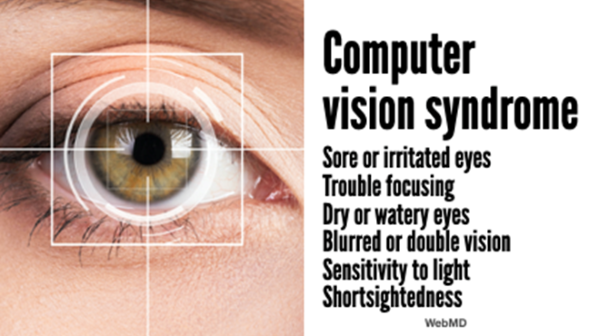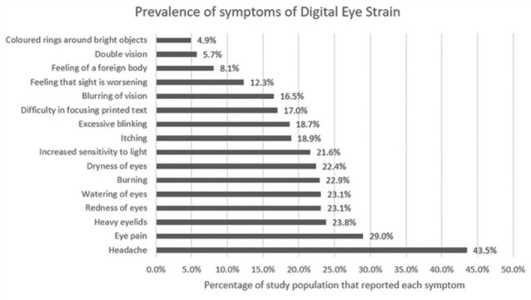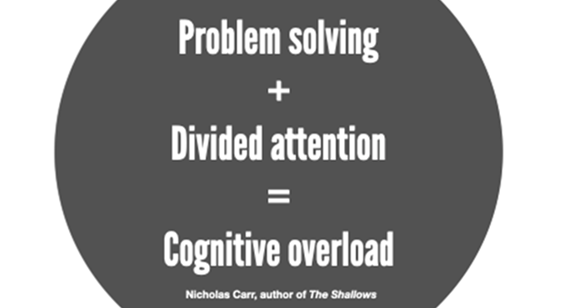Reading online hurts readers’ eyes, their bodies, their brains
I don’t know about you, but one of my goals in life is to never write anything that makes my readers throw up, resign or forget where they parked their car.

But that’s actually possible when writing for the web.
That’s because screen reading hurts your web visitors’ eyes, backs and brains.
1. Screen reading hurts readers’ eyes.
Reading on the screen is hard for a simple reason: Our eyes weren’t made to stare at little beige boxes all day. When reading online, your readers face these special eye problems:
- Light. Reading online is like reading with a flashlight shining in your eyes. And you know what happens when you spend your day staring at a lightbulb.
- Blinking. People blink less often when reading online than when reading print. That’s a problem, because blinking is what keeps our eyes moist and relaxed. They also open their eyes wider when reading on the screen. That makes their tears evaporate faster and leads to dry eye.
- Scrolling. The human eye has a normal reflex called optokinetic nystagmus. That’s scientist talk for the way our eyes flit across the screen to follow scrolling type. That constant jumping up and down can wear your readers out, cause eyestrain and cause readers to feel a little seasick. (So you can cause readers to throw up from what you write online.)

- Sore or irritated eyes
- Trouble focusing
- Dry or watery eyes
- Blurred or double vision
- Sensitivity to light
- Shortsightedness
In a 2020 study, more than 9 in 10 the respondents experienced at least one symptom associated with digital device usage.
Mobile matters: Cases of screen sightedness have increased by 35% since smartphones were introduced in the 1990s.

“I’ve had people come to our clinic saying they were going to quit their jobs because they couldn’t take it,” says David Grisham, optometry professor, University of California at Berkeley.
Not exactly the purpose of our intranet, is it?
So you literally can make people resign based on what you write on the web.
Is yours a site for sore eyes?
2. Screen reading hurts readers’ bodies.
Americans are experiencing more back, neck and shoulder problems because of their handheld devices, the American Chiropractic Association announced recently.

Plus, Americans are getting insomnia and body clock confusion from screen reading at night, according to Harvard Medical School and Brigham and Women’s Hospital. (Another one of my goals in life is to never write anything that makes my readers feel as if they’ve just stumbled off of a flight from Boston to Bhutan.)
Screen reading also causes nausea, headaches and muscle degeneration from sitting, according to the American Cancer Society and The Mayo Clinic. So yes, reading that web page does make your butt look bigger.
Is your site a pain in the ass?
3. Screen reading hurts readers’ brains.
But as writers, our biggest problem is this: Screen reading hurts your brain.
This is your brain on the Web: Constant problem solving (To click or not to click?) plus divided attention (You’ve got mail) lead to cognitive overload.

And cognitive overload, according to Nicholas Carr’s The Shallows: What the Internet Is Doing to Our Brain, leads us to lose the ability to think and reason.
In fact, a study by the Institute of Psychiatry at the University of London showed that online multitasking temporarily lowers your IQ more than smoking marijuana does. (And, from what I’ve read, is not nearly as entertaining a way to get stupid.)
“Try reading a book while doing a crossword puzzle,” Carr in The Shallows. “That’s the intellectual environment of the Internet.”
This problem multiplies on mobile.
(So, yes, you can make your web visitors forget where they parked the car.)
So how can you write web content that makes readers click instead of gag? Get to the point faster, organize better, make it easier to read and more skimmable.
___
Sources: Bahkir, F. A., & Grandee, S. S. (2020). Impact of the COVID-19 lockdown on digital device-related ocular health. Indian journal of ophthalmology, 68(11), 2378–2383.

Leave a Reply